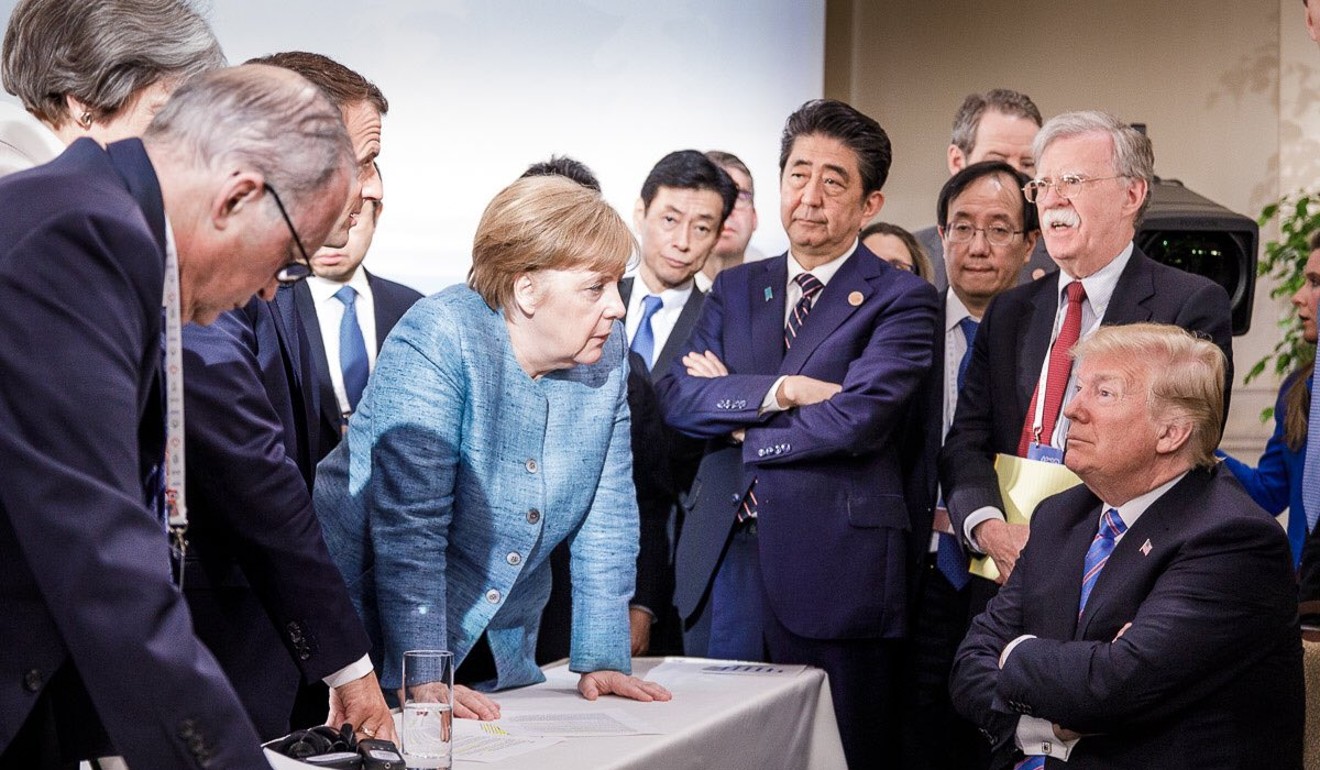
Donald Trump split with G7 allies because Kim Jong-un ‘must not see American weakness’, according to adviser
Dealing with Trump’s whims and last-minute changes of mind has proven a procedural nightmare, analysts claim, leaving European leaders unsure how to preserve any kind of multilateral cooperation
US President Donald Trump’s harsh words for Canada’s prime minister after the Group of Seven (G7) summit aimed to avoid a show of “weakness” ahead of his summit with North Korean leader Kim Jong-un, a top adviser said on Sunday.
“Potus [the president of the United States] is not going to let a Canadian prime minister push him around – push him, Potus around, on the eve of this,” economic adviser Larry Kudlow said on CNN’s State of the Union. “He is not going to permit any show of weakness on the trip to negotiate with North Korea. Nor should he.”
Trump arrived in Singapore on Sunday for the summit, with Pyongyang’s nuclear arsenal at the top of the agenda. The US president has called it a “one-time shot” at peace.
Before leaving Canada for the summit the previous day, the US president took to Twitter to describe G7 host Justin Trudeau as “very dishonest & weak”.
Trump said he had instructed US representatives not to endorse the joint communique issued at the end of the summit.
The US president seemed particularly incensed by Trudeau’s comments in a news conference criticising Trump’s decision to invoke national security to justify US tariffs on steel and aluminium imports.
That decision was “kind of insulting” to Canadian veterans who had stood by their US allies in conflicts dating back to the first world war, Trudeau said.
“Canadians are polite and reasonable, but we will also not be pushed around,” the prime minister said.
Canadians are polite and reasonable, but we will also not be pushed around
During his appearance on CNN, Kudlow also attacked Trudeau, claiming “he really kind of stabbed us in the back”, had instigated “a betrayal” and was “essentially double-crossing President Trump”.
“We were very close to making a deal with Canada on NAFTA, bilaterally perhaps, and then we leave and Trudeau pulls this sophomoric, political stunt for domestic consumption,” Kudlow said. “Trudeau made an error. He should take it back. He should pull back on his statements.”
For many in Europe, the question is now about how best to preserve any kind of multilateral cooperation. Dealing with Trump’s whims and last-minute changes of mind has proven a procedural nightmare, political analysts said.
“How is it possible to work this way if once you have agreed to something, two hours later the guy decides he doesn’t agree with what he agreed with?” said François Heisbourg, a former French presidential national security adviser. “Is there any space for a multilateral order under these circumstances?”
But there were signs, among otherwise frustrated European leaders, that they see Trump and his “America First” agenda as an aberration and not necessarily as expressive of a new reality that will never change.
French President Emmanuel Macron, who among all European leaders arguably enjoys the strongest personal rapport with Trump, did not hesitate to voice his disappointment and displeasure at several moments the summit. But he also emphasised his belief that Trump’s vision of America was at odds with American values.
“President Trump saw that he had a united front before him,” Macron said via Twitter. “To find itself isolated in a concert of nations is contrary to American history.”

Britain’s Prime Minister Theresa May preferred tact to confrontation, even after Trump allies allegedly told The Telegraph newspaper that the US president had grown weary of May’s “school mistress tone” and attention to details.
Asked on Saturday evening by the press whether she “liked working with him,” May responded: “We have a very good relationship with President Trump.”
May did, however, allow that she and Trump had “a very frank discussion” about trade. May is not only hoping that Trump lift new tariffs on European aluminium and steel, but that he will promise a favourable pro-Brexit trade deal with the United Kingdom after it leaves the European bloc.
The president acted and reacted in the childish way he could be expected to
In Germany – Europe’s biggest economy and a top target of Trump’s ire on trade – there was indignation over the outcome of the G7 summit. But there was little shock.
“It was not a surprise,” said Norbert Röttgen, chair of the foreign affairs committee in Germany’s parliament, the Bundestag. “The president acted and reacted in the childish way he could be expected to.”
In much of the European press, the tendency was to underscore the historical significance of the rift between the United States and its continental allies.
Der Spiegel, the German weekly, called Trump’s performance in Quebec “a scandal without precedent” and said that German Chancellor Angela Merkel and other traditional US allies must now be prepared for anything – especially on trade, a topic dear to German hearts.
In a front-page analysis story on Sunday, one of Italy’s major dailies, the centre-left La Repubblica, said that “every move made by the premier has been conceived so as to break the European front and attempt to build an anti-EU axis with Trump”.
For Le Monde, a leading French daily newspaper, Trump’s antics seemed a deliberate attack on the post-war consensus. The newspaper wrote: “Donald Trump is the same age as the world order put in place by the United States at the end of the Second World War, but one would swear he decided that the latter will not survive him.”
Additional reporting by Agence France-Presse

.png?itok=arIb17P0)